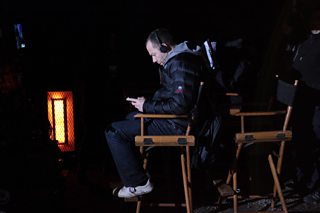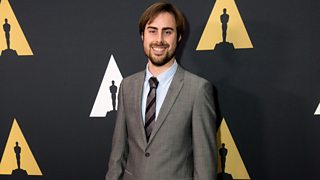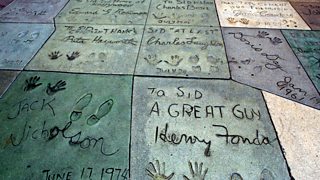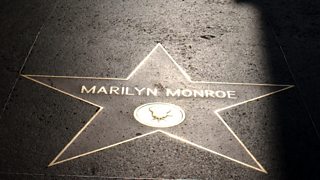Seven ways to become a Hollywood screenwriter
Sally Stott
Writersroom Reader
In 2001, I was lucky enough to go and study at in Westwood, Los Angeles. The campus, which was bigger than most towns I’d been to at the time, was like Oxford University reimagined by Universal Studios. Here, Baz Luhrmann or Jodie Foster stopping by to do a guest lecture was as much to be expected as vending machines selling mini-doughnuts and never-ending flavours of iced tea. With , it was also a place where writing and selling a Hollywood screenplay didn’t seem an unrealistic or even especially ambitious aim, just something that everyone was doing. As my friend Valerie drove me around the city in her truck, the feeling of optimism seemed to stretch from one end of Sunset Boulevard to the other.
Sound great? I certainly thought so. But, as a writer living in the UK, how exactly do you get to LA if you haven’t got a Green Card and you’re not on a university exchange scheme? I decided to find out, by speaking to UK writer , who has worked on TV shows both in the UK and the US; and , the two British winners of this year’s ; and agent , who looks after a number of UK screenwriters working on movies in the US. Here are a few of their thoughts on the different ways you can ‘break into’ America:

1. Get work as a UK writer – and use it to propel yourself into the US
When Matt Jones started his TV career, as a storyliner on in the late 1990s, he never dreamed he’d end up in a Writers Room in LA. And yet, just over ten years later this is where he found himself, working on a “sweary, violent, undercover cop show” called . But it might have never happened if he hadn’t asked if, as a favour, he could write a practice report on a script Davies was working on at the time – one that turned out to be . Matt’s notes went down so well he was offered a job as a script editor on the series. More script editing work followed, on and . “I’ve always been very lucky in my career,” Matt says, “I’ve worked for very talented writers.”
It was through script editing that Matt got his first UK writing commission. He was working on a new series, , when the final episode fell through at the last minute. Producer said to him, “Matt, you’ve written things. Go home and write this half hour script by Monday.” And that’s what he did. Next he wrote for , wrote and produced his own original single drama, , and produced . “I wrote in the evenings on shows and then produced in the daytime,” he says, “It was crazy.”

Matt Jones
But it was as a producer rather than a writer that Matt ended up working in New York and Toronto for a year, on the American version of . At around the same time he was commissioned by UK producer to write a script about four gay best friends based upon his childhood. It didn’t get commissioned in the end, but became his ‘calling card’ script. “Off the back of [that script] I got a job as a writer in America on Rogue, and so I was in a Writers Room in Los Angeles for 10 months,” Matt explains, “It was a British Canadian co-production, so they needed British writers. And one of the production companies knew me from working in Toronto on Skins.”
Matt thinks that the UK writers who have found work in the US “most successfully are the ones who have established themselves very strongly in the UK first.” However, getting commissioned here isn’t the only way to attract American producers’ interests.

Melissa Iqbal at the presentation of the 2014 Academy Nicholl Fellowships Screenwriting Awards (image: Jordan Murph / Β©A.M.P.A.S)
2. Win a writing competition Americans have heard of
Two of the four winners of this year’s Academy Nicholl Fellowship – basically the Oscars for new writers – are British: Melissa Iqbal, and Sam Baron. When I speak to them they are about to head off to Hollywood for an awards ceremony which, I like to imagine, will be a cocktail of glitter, diamonds and emotions – or, at the very least, provide good opportunities for networking.
I ask Melissa whether she thinks it will lead to more writing opportunities in America. “I think it’s a fantastic way to break into America,” she says, “The Nicholl Fellowship is really well respected, especially in the US, so there’s been a lot of interest in [my] script, which is fantastic. It’s a great way to get your name out there.”
Sam agrees: “Just being shortlisted was incredible, but winning was mind-blowing. [It] opens lots of doors in the US. As soon as you get shortlisted, you wake up to find hundreds of emails from producers, agents and managers all congratulating you and wanting to read your script and meet you.”
Both Melissa and Sam point out that it’s still early days, with having only been announced in October, but when it’s difficult to get anyone to read your script in the UK, let alone America, winning a prize, particularly one that is well-known over there certainly seems to help. However…

Sam Baron at the presentation of the 2014 Academy Nicholl Fellowships Screenwriting Awards (image: Jordan Murph / Β©A.M.P.A.S)
3. Don’t give up if you don’t win a writing competition Americans have heard of
Not everyone agrees on what a prize-winning script looks like. Sam says: “The thing to remember with these contests is that while they’re great if you win…you can’t take it too hard if you don’t win. The day after I won the Nicholl Fellowship, I got rejection emails from two other screenwriting contests, for the exact same draft of the script – so it’s all subjective. A handful of rejections are no reason to give up.”
Melissa almost didn’t enter the Nicholl Fellowship at all. “I’d never had much luck with screenwriting competitions in the past,” she says, “I was feeling a bit disheartened at the time, but I told myself every competition is different and has different readers, so you never know. Of course I never thought I would actually win!”

4. Get an agent with connections in America
When I first speak to screenwriters agent Ed Hughes he’s about to jet off to LA for the kind of jam-packed business trip of appointments and meetings that I like to think I’m familiar with purely from reading Julia Phillips book ‘’. I ask him how he gets UK writers work in the US. “Ideally we hook them up with a US agent and/ or manager,” he says, “The US reps can then spearhead looking for US work. But we have also got clients work direct from the UK with US companies. Most often [this is] by getting their feature spec scripts optioned by US companies.”
However, as pretty much everyone knows, getting an agent isn’t easy. “A [US] agent is good, but if you’re early in your career you’ll have a hard time landing one,” says Ed, “A good manager is actually a better bet to start off with. They are more focussed on the career development side of things and tend to be more proactive than agents.”
Having a well-connected agent and/ or manager certainly sounds useful. Matt, Melissa and Sam all have one (Bethan Evans at , Tracey Hyde at , and Amanda Davis at , respectively) although at some point in their careers they didn’t and still managed to get to where they are now. There are also lots of things you can do without an agent, such as…

Handprints on the pavement outside the TCL Chinese Theatre on Hollywood Boulevard
5. Write a spec script Americans might like – but make sure you like it too
Some scripts feel perfect for an American audience. Others feel like the writer has been so dazzled by imaginary gold dollar signs that the characters, dialogue and story have disappeared under pile of estimated earnings calculations.
Ed suggests writing “several great US-set spec [scripts]” and to “write commercial material” but also “high-quality material, of course.” Regarding what American executives are looking for, he says “[There are] probably less period drama movies in the US than the UK. More genre TV shows get made in the US as there are more outlets for that kind of thing and more of an appetite too. More sports movies get made there than here. They love a good inspirational true story sports movie… One thing executives will ask for is a strong voice or unique point-of-view. But also big ideas and concepts really appeal.”
Talking about her Nicholl Fellowship-winning script, Melissa says: “I didn’t write it for an American audience, but I do tend to write quite commercial stories and usually genre. Having said that, I took the opportunity to write something a bit different…Obviously scripts should be written with some thought to how they might be marketed, but everything else should be from the heart.”
Sam explains how he came to create his prize-winning script: “I didn’t write it with an American audience in mind – although I do love lots of American movies, particularly character-driven American indies, and I did set out to write the film I would most like to see, which is how I’m convinced all films should be written – so perhaps it happened accidentally.”
In the we often read screenplays aimed at an American audience where the characters talk in a strange, heightened movie-inspired kind of language that doesn’t exist in real life or, indeed, movies (at least, not good ones). Like a lot of British writers, something Matt struggled with – when he was writing Rogue – was getting the America characters’ voices right. “It’s easy to work out the words you need to use,” he says, “but what’s hard is to realise what the phrases are that we use that they think sound really weird. And there are lots of those.” So how did he manage to avoid them? “It was really about being in America, reading other scripts and watching the actors,” he explains.

Star on the Hollywood Walk of Fame
6. Work in other areas of the UK film and television industries
“It’s not what you know, it’s who you know,” people sometimes say – and a good way of getting to know people is by working with them. Matt had jobs as a storyliner, script editor and producer before becoming a full-time writer, which led to some great contacts in the industry, such as Russell T Davies and Nicola Shindler.
Sam has also worked in other areas of film and TV and started off “making no-budget films with my friends as a teenager”. He explains: “They often didn’t even have a script, but we had an unexpected success when one of them went viral.” After going to university, he got a job as a runner. Despite doing long production days he describes how “every evening and weekend I would write, and lots of my Nicholl script was written in the margins of tattered call sheets on set, and then carefully transcribed on the night bus home.” After two years of writing his script, along with jobs in Development at Ealing Studios and as a script reader for Βι¶ΉΤΌΕΔ Drama and Βι¶ΉΤΌΕΔ Wales “some very supportive colleagues introduced me to my agent at Curtis Brown, who started getting me meetings with lots of producers, and soon after that I won the Nicholl Fellowship.”

7. If you can, take a trip to LA
Ed regularly visits LA and thinks writers who want to work there should aim to do the same, if their circumstances allow it. “You need to be ready to get over to LA at least a couple of times a year, for maybe two weeks at a time,” he says, “LA is the main place [in the US]. There’s not much happening in New York or elsewhere.” Obviously, this won’t be possible for everyone, but sometimes writing work can take you there.
Matt moved to LA to work on Rogue, since being part of a team of writers in a Writers Room meant he needed to go into the office every day. “I think you really have to be in America to write American TV,” he says. “All of the big shows have a Writers Room…You get a weekly wage. You are employees.”
Whereas Matt works in his home office when he’s in the UK, in LA it’s very different. He talks about juggling writing an episode with other responsibilities, such as storylining and polishing other writers’ scripts: “They wouldn’t let me go home and write my [episode]. I said, ‘Look, I’m not writing the script because I’m doing 10-hour days in the Writers Room.’ [The showrunner] said ‘You’ve got four days. Go in that room and write a script.’ I said, ‘Can’t I go home?’ and he said, ‘No, I need you around.’ So I sat in an office for four days and wrote.”

Los Angeles skyline
While becoming a Hollywood writer might often seem exciting, glamourous and well paid, it’s not all dark sunglasses, large cheques and apartments overlooking Santa Monica Beach. Ed explains: “[American] TV is more stable business these days, for sure. On the movie side there is not much of an indie scene in the UK, whereas there is a good indie scene in the US, which means more targets to aim for and hopefully hit.” However, “competition is fierce and [in the US] TV is now filling up with movie people looking to reap the benefits of the TV world.” Does Ed think writers get treated better in the UK or the US? “I think they get a hard time wherever they are generally!”
Matt explains some of the differences between writing for American and British television: “[In the US] there’s a massive investment in the writing process. We [writers] mapped scenes out and pitched things over and over. There was much less rewriting than in Britain and consequently when we wrote our first drafts, we wrote them very quickly. I wrote mine in four days.”
However, you don’t need to go to the US to experience the American way of working as, increasingly, it’s being adopted here. Matt has recently been working on , which runs a mini-Writers Room. He says: “Gradually producers have learnt that it’s better to spend a bit more money initially so writers can spend more time with the lead writer and really feel a series and understand what it is... But you’re still undergoing the process of writing drafts, getting notes and rewriting. That’s the same whether you’re in a Writers Room or home office.”
“I think people love to be negative about both the British film industry and the whole notion of Hollywood,” says Sam, “and I’m sure they have their reasons, but I think there’s brilliant creative work happening in both places, in film and TV.” Melissa agrees. “I used to think Britain didn’t like big concepts,” she says, “This couldn’t be further from the truth.”
Unlike writers who spend many years trying to get to Hollywood, Matt never had a dream to do this. For him, living in LA and writing for a US television show was a surprising but enjoyable opportunity. It “came out of the blue,” he explains. “And it was great, it was a fantastic experience. But my first love is British television.” He’s currently working on two new pilots: one for Channel Four and one for Βι¶ΉΤΌΕΔ America, but he would like go back to LA in the future.
Nearly 15 years after I was in America, I feel the same. And so, as Melissa and Sam head off to Hollywood for their awards ceremony and Ed rattles through his “crazy schedule” of meetings there, I start planning ways I too can step out of a plane at LAX into the world’s most glamourous car park. “Dear UCLA, you know you said ‘if ever I want to come back…?’” Dear Nicholl Fellowship, do you ever use British script readers…?” “Dear Valerie, do you still have the truck…?”
Sally Stott is a script reader for the Βι¶ΉΤΌΕΔ Writersroom and regular contributor to the Βι¶ΉΤΌΕΔ Writersroom blog.
- including a blog about her time in LA and other stories
Sally Stott is on Twitter
Watch interviews with & on our website
